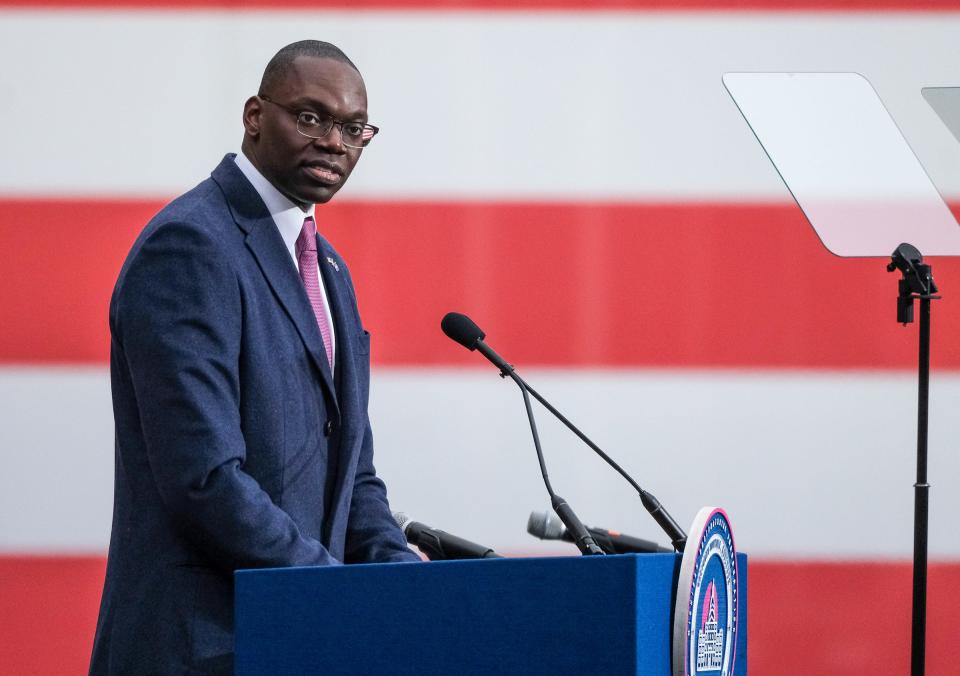Lt. Gov: Legacy of racial disparities task force to live on
After nearly three years, the Michigan Coronavirus Task Force on Racial Disparities has issued its final report, and the federal COVID-19 public health emergency is expected to end in May.
Although the coronavirus hasn't disappeared — it continues to infect, hospitalize and kill people, though at a far lower rate than earlier in the pandemic — the focus on COVID-19 among policymakers is fading.
Lt. Gov. Garlin Gilchrist II, chair of the task force, spoke with the Free Press about the success it had in reducing racial disparities in COVID-19 deaths in Michigan, and about the work that remains to be done.

The following is a lightly edited transcript:
Q: What will become of the task force now?
A: "The original charge ... was to reduce the disparity for mortality rates from COVID-19, and the second one was essentially to take the things that we learned in that process and apply them in other areas to reduce disparities.
"That second piece ... is what the legacy of this task force will be. You see that reflected in a number of the programs that our administration has proposed, enacted and funded that deal directly with reducing disparities ... in health care outcomes, things like the Healthy Moms Healthy Babies initiative, which we fully funded. That $20 million is going to really help address the maternal mortality rate disparities between Black women and white women, for example, and that’s led to … proposals and enactment of funding for increased doula services, doulas covered under Medicaid, the Plan First initiative for healthy family planning, and lots of other pieces in that regard.

More:Report: Michigan closed the gap on COVID-19 racial disparities
More:Why are racial disparities in Michigan’s COVID-19 cases and deaths shrinking?
"That's led to programs like the funding that we put in the budget last year for adults with sickle cell anemia. This was a direct task force recommendation and this is really focused on that population where we have young people who have sickle cell anemia, and when they turn 18, they don't stop having sickle cell. ...
"You also have seen some of the other work of the task force be reflected in ... efforts from the Poverty Task Force that we set up and others. How this goes forward is you'll see the recommendations enacted throughout state government ... that will change the way that decisions are made in the Department of Health and Human Services and across the board."
Q: Will there be a new task force focused on other racial health disparities?
A: "Michigan was a leader ... and stood alone in our COVID-19 response as far as prioritizing, addressing and eliminating these racial disparities in mortality rates. We want to extend that leadership to other areas where we have disparate health outcomes.
"That is an overall charge by our administration with everything, including things like the declaration of racism as public health crisis. It really unlocked a lot of tools and opened up a lot eyes for state government agencies and departments to be able to examine what they're doing to make sure that they're always thinking about how they can eliminate and reduce disparities as well.
"I can't (say) that there will be a new task force, but what I do know is that it's the responsibility of everyone in our administration and at the leadership level and in our state government employees to be thinking about how we can eliminate disparities."
Q: The end of the pandemic emergency declaration also brings Medicaid redetermination, which means that many low-income and at-risk folks could lose health insurance coverage in the near future. How does the administration foresee addressing that issue?
A: "One of the things that we noted early on in the pandemic was that one of the contributing factors to there being worse outcomes from COVID in communities of color was because a lot of people color didn't have insurance or didn't have adequate insurance or access or connections to the services they needed.
"And so through our primary care connections working group, we were able to help people navigate systems to be able to get connections to care. We took advantage of expanded access to things like Medicaid so more people could have access to doctors. We also have looked at … reevaluating Medicaid reimbursement rates to create different incentives for medical care providers to locate in communities where people are more vulnerable, where people may have higher rates of asthma for environmental reasons. ...
"As far as what happens with … Medicaid (redetermination), that is something that we're taking a hard look at right now, but what we can do and what we do know is that people with health insurance have better health outcomes. People with primary care physicians and a real relationship with a health care professional have better health outcomes, and so we're going to try to make sure we can bridge those gaps."
Q: There remained a disparity in 2022 among American Indians and Alaska natives in Michigan when it came to COVID deaths. Are there any ongoing efforts to address that?
A: "There is still more work to do ... in particular among members of our tribal nations and Alaska natives in the state of Michigan. We actually have worked really well with our leadership members of our tribal nations. ... I have spent a lot of time, for example, with the Bay Mills tribe, going through some of their facilities and the infrastructure they created ... to respond to the pandemic and address the disparities. And we've shared our knowledge with leaders of our tribes. ...
We're going to continue to work together as partners between our tribal nations' leadership and state government to make sure they have resources to continue to work to eradicate not only these disparities, but we have a lot of other disparity work to do amongst our tribal communities."
Q: What else is important for you to convey on this issue to people in Michigan?
A: "What I’d like to reiterate is ... that where you focus your attention and where you put forth effort, you can make progress. Michigan has demonstrated that with this effort and pulling together a team with diverse perspectives and diverse experiences: public health professionals and labor leaders and faith leaders and young people and educators and community organizers, private sector representatives, legislators, coming together and offering their perspective all toward a common goal of saving people's lives."
Contact Kristen Jordan Shamus: kshamus@freepress.com. Follow her on Twitter @kristenshamus. Subscribe to the Free Press.
This article originally appeared on Detroit Free Press: Lt. Gov: Legacy of racial disparities task force to live on

